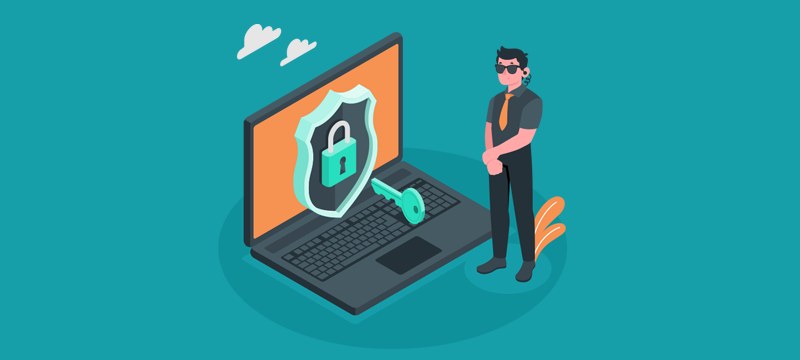For any web business, their website is the most prominent digital asset, as well as the first point of contact for their end customers. Websites play a crucial role in establishing the digital footprint of a business and proper security mechanisms are a must to be deployed to protect the website and the data present on it from all kinds of online threats and vulnerabilities. An up-to-date and well-maintained website usually offers a secure experience for website visitors, resulting in higher trust and brand recall.
Unsecured Website- What are the Consequences?
Any business website that is secured deploys some form of encryption for encrypting the critical/confidential data present on the website. Encryption of the website’s data is usually performed by a pair of encryption-decryption keys. These keys have been proved to be extremely beneficial as the websites achieve enhanced security levels and it becomes quite difficult for an unauthorized user to breach them.
Let’s discuss some of the issues that may be present with an unsecured website and what consequences it could have on business.
Consequence #1: One of the significant consequences of having an unsecured website is that it results in a loss of trust with the customers as they will refrain from interacting with such websites.
The primary concern for any website visitor is security. Websites with an HTTPS prefix in their URLs help customers to gain confidence that their identity or information entered will remain secure by encryption and that it is safe to interact with such websites.
Consequence #2: A hacked website usually makes a denting image on the hosted server, resulting in the possible closure of the website.
A hacked website leads to a tarnished brand image of the business. Thus, to establish trust and form positive associations with their potential customers, businesses must ensure that their website is properly secured with a combination of firewall, anti-virus, and vulnerability scanners, to be discussed in the forthcoming sections.
Practices for Website Security
Now, after seeing the consequences of an unsecured website, we’ll be talking about some of the best practices that businesses can follow for securing their websites-
- Encryption Using HTTPS HTTPS covers various security features that might be needed by a web business and its end users. The primary benefit of using an HTTPS site is that it makes the business website more secure for the customers by encrypting sensitive/confidential information of the customer. In a secured website, the hackers fail to gain access to the encryption key, thereby preventing the “man-in-the-middle attack.” Also, HTTPS offers an array of website security benefits to website visitors such as
- The content present on the site hasn’t been altered by any third-party user (except for the website owner/admin)
- Any information that is exchanged between the website visitor and the website remains secured and details won’t be shared elsewhere
- All the payment gateways present on the site are secured and fully compliant with the various payment certificates
- Using SSL Certificates Secure Sockets Layer (SSL) is the underlying protocol used by HTTPS. So, to enhance the security of their websites, businesses must compulsorily install an SSL certificate. The SSL certificates help in encrypting data that is sent from the customer’s browser and received at the company’s server. As previously mentioned, having an SSL certificate installed helps the business to overcome negative SEO, thus ranking the websites higher. Usually, the encryption range starts from 128-bit to anything. In general practice, it is considered that the higher the encryption levels, the better the security would be.
- Using a Trusted Hosting Provider businesses must make sure that their website is secured by a trusted website hosting provider. With a trusted hosting provider like bodHOST, business owners with a lot more than website hosting. It ensures that business owners get security mechanisms like SSL Certificates, DDoS protection, remote backups, website scanners, etc. The security protocols of a hosting provider are going to be the first line of defense in case of any cyberattacks, ransomware, or any malicious activity.
- Scanning Website for Vulnerabilities Businesses must scan their websites regularly to detect any kind of threats and vulnerabilities that might arise. Having a regular scan of the website ensures that the website data is secured from all types of malware and vulnerabilities. Scanning tools such as VTMScan perform Content Change Monitoring that notifies the business owners regarding any alteration that might have been done to the website content.
- Backing Up of Websites The businesses also must ensure that their websites have been regularly backed up. Having a timely website backup can prove to be extremely beneficial in case the website gets hacked. Timely backups help in quick retrieval of the sites during hacking and cyberattack events. In general practice, it is stated by the domain experts that the website backups must be present at a different location/server to avoid unnecessary losses in case the hosting server suffers downtime or hacks.
- Deploying Strong Passwords businesses must ensure that their users implement secure and strong password mechanisms on all the sites that they visit. Such strong passwords make it difficult for the hacker to guess and drain out critical information. Businesses can even use various password managers that can prove to be useful tools for generating strong passwords. Users must prevent using the same password across different sites, as it increases the probability of hackers gaining access to user accounts.
Concluding Remarks
For any business, websites are the prima facie and the first point of contact for any new customer. By using robust security mechanisms, companies must ensure their website has been properly secured against hackers and cyberattacks. Businesses must also understand the consequences mentioned in the article that an unsecured website can have on their website.
Secure your website and other crucial digital assets today with bodHOST which offers an array of security solutions for your business.
